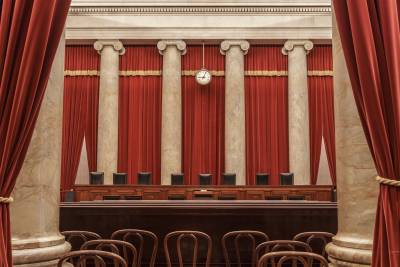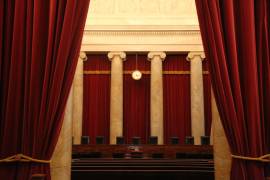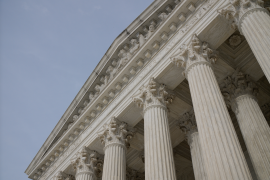
Amid Historic Diversification, Federal Judiciary Still Falls Short of Representing LGBTQ+ Community
Blog Search
It is clear that President Biden will be remembered as a champion for diversifying America's federal courts. His nomination of Judge Ketanji Brown Jackson to be the next Associate Justice of the Supreme Court will be an important part of his legacy, and yet it’s only part of the story. To date, 73% of President Biden’s judicial nominees have been women and 67% have been people of color. Even as we celebrate this incredible progress, we must recognize that there remains much more work to be done to improve the dramatically under-representative composition of our federal bench.
Among other shortcomings, representation for openly LGBTQ+ Americans on the federal bench continues to fall short, and the needle has barely moved over the past fourteen months, with only 6% of Biden’s judicial nominees openly identifying as LGBTQ+. LGBTQ+ Americans currently make up nearly 8% of the adult population, a percentage that will increase as younger generations cast off the stigma of identifying as LGBTQ+. Yet only 1.6% active federal judges openly identify as gay or lesbian. There are 33 states, plus the District of Columbia and 2 territories, without any openly LGBTQ+ judges on the district or circuit courts; and there has never in history been an openly bisexual, transgender, or nonbinary federal judge.
Research has shown that a more diverse make-up of the bench enhances the caliber of decision making, as judges with different identities and backgrounds can add a check on biases that run rampant in courts across the country. Furthermore, litigants are less likely to accept a court’s pronouncements when they don’t see themselves reflected in the court system. With a judiciary that was already overwhelmingly dominated by straight, cisgender, white men, and became more so after four years of the Trump administration, these problems will continue to persist, with particularly devastating consequences for over 20 million LGBTQ+ Americans.
According to a Lambda Legal report surveying LGBTQ+ individuals and people living with HIV, 43% of participants who interacted with the court system had negative experiences. Nearly 20% of respondents reported hearing a judge, attorney, or other court employee make negative comments about a person’s sexual orientation, gender identity, or gender expression, and 16% reported feeling their own sexual orientation or gender identity was raised by an attorney or judge when it wasn’t relevant. The procedural and emotional implications of this courtroom misconduct represents the failure of our judiciary to uphold its promise of equal justice under the law.
In his second year in office, President Biden simply must do better in terms of prioritizing the nomination and confirmation of openly LGBTQ+ judges to the federal bench — judges who can empathize and identify with the discrimination that LGBTQ+ and other marginalized people face, and who can work to educate their peers on the bench. Senate Majority Leader Chuck Schumer must also play his part by bringing nominees to the floor with the urgency that the moment demands.
The stakes have never been higher. Last year was the worst year on record for anti-LGBTQ+ legislation, and this year is on track to set a new record. We need a judiciary that can vindicate our Constitution’s promises of liberty and justice for all and for these institutions to reflect the diversity of the communities they serve. Now more than ever, LGBTQ+ people, particularly our youth, need to see people like them serving on the federal bench and in positions of public trust.
As we commend the Biden administration for nominating our country’s first Black woman and first federal public defender to the Supreme Court, we also renew our call for meaningful action to address the lack of diversity in the lower federal courts. There are 52 current and 32 future vacancies in district and circuit courts currently lacking nominees, presenting immediate opportunities to make progress on this front. For example, the First and Fourth Circuit Courts of Appeals both have vacancies and currently lack any openly LGBTQ+ representation at either the district or appellate level.
Our federal courts have a monumental impact on the lives of everyday people across the country. This is especially true for the lower courts, where thousands of cases are decided each year that will never be heard by the Supreme Court. We need the Biden administration to prioritize the appointment of openly LGBTQ+ people to the federal judiciary, along with other marginalized and underrepresented people like those living with disabilities and Native Americans. Nothing less than the legitimacy of our nation’s justice system is at stake.
Sharon McGowan is the legal director and chief strategy officer for Lambda Legal. Sharon was an Obama administration appointee in the role of Acting General Counsel and Deputy General Counsel for Policy at the U.S. Office of Personnel Management.




